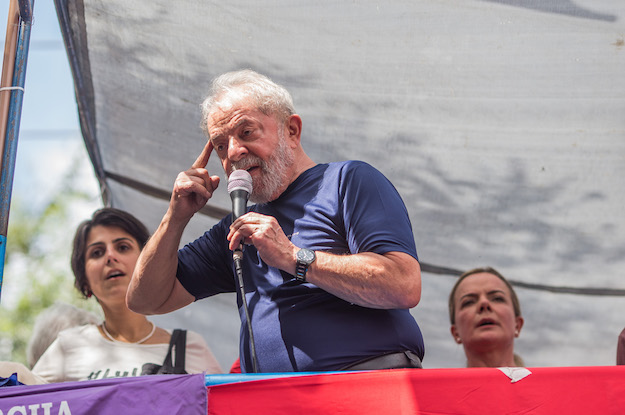If you want to understand why the Car Wash corruption investigation is at a crossroads, not just in Brazil but throughout Latin America, consider the following:
Luiz Inácio Lula da Silva is in jail.
Fernando Collor is running for president again.
Collor, of course, was Brazil’s leader from 1990 to 1992, when he was impeached amid a truly epic corruption scandal involving a private jet known as the “Black Bat,” a house with eight artificial waterfalls and perhaps the ultimate betrayal – the accusations came from his own brother. Collor denied it all, laid low for a while and then began a comeback. Elected to the Senate in 2006, Collor has reinvented himself as a refined, multilingual man of the world, even becoming head of the Foreign Relations Committee last year. In January, he declared his intention to return to Brazil’s highest office, telling a crowd that “what’s important now is to look forward,” a phrase that in his case presumably had more than one meaning.
Collor is currently polling at about 2 percent, and has exactly zero chance of returning to the Palácio da Alvorada this October. But that’s not the point. For many Brazilians, he is emblematic of everything that is wrong with their country’s politics and unfair about its current corruption purge. Indeed, there is no evidence that Collor, now age 68, has changed his ways. Federal police seized a Ferrari, a Porsche and a Lamborghini (!!) from Collor’s house in 2015, and he was indicted for corruption and money laundering as part of the sprawling Car Wash case last August. As ever, he has denied wrongdoing. But because of the special legal protection known as foro privilegiado that thousands of political office holders in Brazil enjoy, Collor remains free, and may not face trial for several more years, if at all.
Disgust over impunity has been building for years. But it takes on new meaning in the wake of Saturday’s arrest and imprisonment of Lula, who also wants to be president again – and unlike Collor, would almost certainly win if allowed to run. The race is now on to show that justice truly applies to everyone, not just in Brazil, but elsewhere in the region. Otherwise, the whole anti-corruption movement is at risk of losing momentum, if not collapsing entirely.
I’ve focused on Collor but there were truly countless other choices. According to a recent tally by Agence France-Presse, “more than half of Brazil’s 81 senators and just over a third of its 513 (deputies) have been ordered to appear in court in connection with allegations of graft.” Few are expected to face justice anytime soon. I am writing this from Lima, where reverberations from the Car Wash case forced a president to resign last month. Another former Peruvian president is in jail; another may be headed there; still another was pardoned as part of a political deal last year. That sounds like a lot, but there are still swathes of the establishment that have been immune from prosecution, and everybody here knows it. “There’s no justice in Peru. The politicians just use prison as a tool to fight each other,” a street salesman told me, echoing a sentiment I heard from CEOs here, too. The sense of justice for some, but not others is also a main theme at the moment in Argentina, Mexico, Panama and elsewhere.
Perception matters, even when it’s at least partly incorrect (Politicians from 14 different parties have been indicted by the Car Wash probe in Brazil, for example). Without public support, the supporters of the status quo – crooked politicians and their enablers in the private sector – would have used the formidable tools at their disposal to short-circuit these investigations many years ago. During the early years, it was possible to say “Hey, be patient, they’re just getting started.” But Car Wash and its cousins are now four years old – middle aged, as these things go. It is fair to ask for broader results.
Addressing these imbalances will require the removal of foro privilegiado and other protections for corrupt politicians, but not only that. It will require prosecutors consciously going after all guilty parties with equal vigor, and being much more conscious of perceptions that they are biased against their targets. It will also depend on the private sector, civil society and politicians sympathetic to the cause – yes, they do exist – taking steps to reduce corruption itself. This week, our parent organization Americas Society/Council of the Americas published a report with several audacious but viable proposals for doing just that. (You can download it here.) They range from reforms that would allow more new voices in elected office, to greater support for the investigative journalists who often uncover scandals.
Without deeper change, and soon, it’s easy to see how history may remain stuck in a never-ending cycle. After all, Collor won the presidency in 1989 primarily because of his vow to eradicate Brasilia’s “maharajahs,” the corrupt government officials who supposedly lived like Indian princes. That vivid message carried Collor to a runoff victory against a bearded candidate who similarly vowed that “the place for corrupt people is in jail.” That candidate’s name: Luiz Inácio Lula da Silva.






